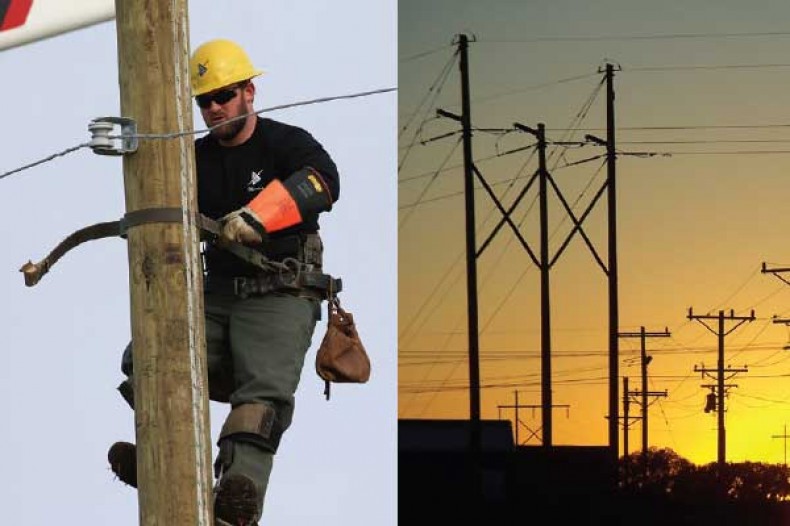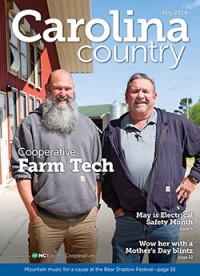How good are electric co-ops? Ask Wall Street
Independent analysts see strengths in the co-op business model
By Paul WesslundElectric co-ops are good businesses. Just ask an executive of the hard-nosed Wall Street credit research group Fitch Ratings. Dennis Pidherny, managing director and head of public power, said last year, “The hallmark of the electric co-op sector has been its financial strength and stability.”
“It’s a business model that works,” says Mel Coleman, president of the board for the National Rural Electric Cooperative Association.
The business model Coleman refers to is a utility owned by the same people who buy its electricity. As a not-for-profit business, all of a co-op’s resources go to keep prices low and quality of service high.
“We have financial targets to meet to stay in business, but we’re not driven by the need for excessive profits or stock value,” Coleman says. “The reason we’re in business is all about member satisfaction in the price they pay and the quality of the product they get.”
Co-ops are financially strong
A leading expert on co-op financing is Sheldon Petersen, CEO of the National Rural Utilities Cooperative Finance Corporation (CFC). CFC is itself a co-op, created by and owned by electric co-ops across the country to raise money on their behalf. Building electric lines and power plants is enormously expensive, and CFC currently has more than $21 billion in loans to electric co-ops.
When a co-op needs an expensive power plant or transmission line, it will look for outside financing, including Wall Street firms looking for safe places to put money from pension funds, mutual funds and other investors. And when those investors look at electric co-ops as places to get a safe return on their money, they like what they see.
Petersen agrees that “the co-op model is a real strength” for raising money from investors.
“Our business motivation is different,” Petersen says, comparing co-ops to investor-owned utilities. “Our objectives are not to maximize the rate of return, our objectives are to minimize costs to the members. That’s very positive for us and leads to competitiveness.”
Petersen cites additional characteristics that make electric co-ops strong and reliable businesses that investors like: they provide an essential service everyone wants; they face limited competition, which avoids some of the disruptions and unpredictability of other industries; and compared with other types of utilities, they serve a much higher proportion of residences, which can provide a more consistent customer base than other businesses.
Petersen says investors view co-ops as “a stable industry that can withstand a lot of the stress in business cycles.”
And the Wall Street investment rating firms back that up by regularly giving co-ops strong ratings of “A” and “AA”.
A 2015 report from Standard & Poor’s Rating Services praised co-ops as an industry that over the years has made good business decisions on such major issues as environmental regulation and electricity deregulation. That report said, “Over the years, these utilities have withstood many challenges, including costs of complying with emissions controls, adapting to restructured wholesale markets and dealing with the economy’s effects on ratemaking flexibility.”
And a 2014 Fitch Ratings report that declared electric co-ops “fundamentally sound,” said, “Almost a century after the passage of the Rural Electrification Act, the sector remains largely true to its core mission of providing low-cost, reliable electric service to its member-owners.”
Who We Are
We turn the lights on. We are we, not I or they. We are members. We are owners. We are parents, siblings, grandparents and cousins. We see the opportunity in supporting one another. And all those within our communities. We are family. We leverage generation. We learn from the past. We power the future. We are adaptable. We love what we do. We play well with others. We love to laugh. We never miss a chance to express gratitude. We know local matters. We are built for you. We are built by you. We generate community together. We give back. We give often. We never stop imagining what a good life takes and gives back. We invest in the environment because we rely on the environment. We must. We invest in our children’s children. We believe in a better tomorrow. We are driven by connection. We embrace the work and the joy of daily life. We operate on principle. We offer value. We are yours. We are yours to own. We always have been. We always will be. We see good things happen every day. We are people helping people. We remove barriers. We don’t create them. We are limitless. We get the job done. We dare to be different. We are on time. We are timeless. We honor the individual. We celebrate the collective. We are many members. We are one force. We are one vision. We are building a better world. Now. Together.
We Are Cooperatives.
We Are North Carolina’s Electric Cooperatives.
Cooperatives for a Better World
CCA Global Partners, founded by Howard Brodsky, is dedicated to teaching the world about the benefits of cooperative businesses. At its Building a Better World website, CCA Global Partners says its goal is “to spread the word about cooperatives to employees, members and the unaffiliated public. By spreading understanding and awareness, we feel we can increase usages of cooperatives, respect for cooperatives and help cooperatives recruit talented employees. An increased affinity for the cooperative business model will help to build a better world for everyone.”
For more information, go to buildingabetterworldnow.coop
About the Author
Paul Wesslund writes on cooperative issues for the National Rural Electric Cooperative Association.-
Share this story:




